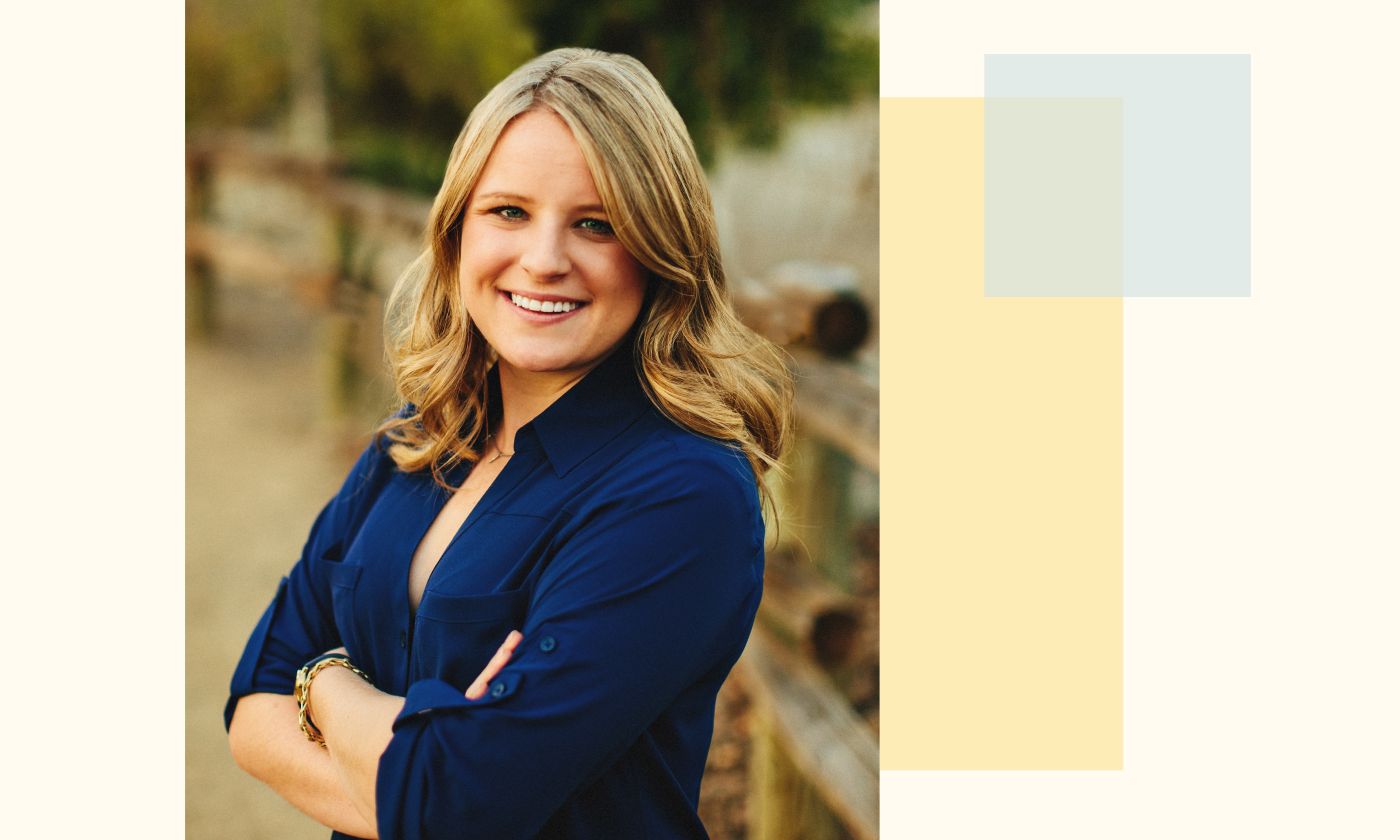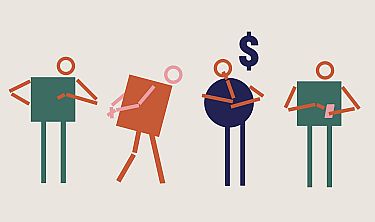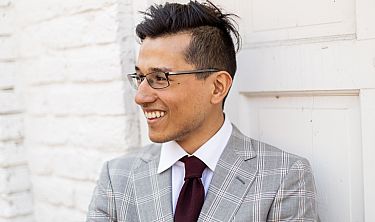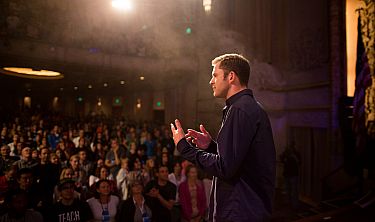Ready to turn your skills into an independent business? Emma Siemasko has advice for you.
Emma is a writer-turned-business-owner who is generous with her time, advice, and big personality. She shares her musings about writing, marketing, and owning a business in her “Whackadoodles” emails. We asked Emma how she got started as a business owner and what advice she gives other creatives who want to strike out on their own.
How did you start working for yourself?
It’s always funny trying to tell the story, because I think, “Did it start on the day I was born? Or later?” There's always been a part of me that's been independent and scrappy, so that lent itself to running my own thing. But in terms of the career steps, I studied poetry in college, which is basically as far from a business degree as you can get. It was difficult for me to imagine how I’d apply my degree. I knew writing was everywhere, but I didn’t understand how my degree might translate to getting paid.
I graduated and taught English in South Korea, and when I was there I started working on English language textbooks. The boss at the Korean school recognized that I was the best writer he had on staff and soon I was doing the bulk of the writing and editing my colleagues’ work. At that point I realized, “Wow, I'm a lot better at this than most people.” I realized I had a professional skill.
When I got back to the States, I started working at a content marketing agency. I was so miserable there that I started my first online business. It was just a goofy side business — an online dating business called Frog2Prince. I helped people write their online dating profiles. But it was fun, and it’s actually what helped me get hired at my next job at a tech company that had a product for small business owners. They saw I had an entrepreneurial spirit.
I worked in-house at that company for three years, and I started to realize that some freelance writers were much more successful than I previously imagined. People think of freelancers as people who take any work that comes their way — they’re starving artists. But I saw how much my company valued writing. We hired a lot of freelancer writers and consultants. I wanted to be on the other side.
I started taking on a few freelance writing clients. I was part of a really great content marketing group in Boston, and a bunch of people needed help with one-off projects. I really enjoyed the variety of work, so I started doing outreach and finding more opportunities. I was pretty confident in what I was doing, and I reached the point that I was ready to quit my job.
What scared you about working on your own?
My number one concern was money. I think that’s usually people’s biggest concern. Maybe they think they’ll be able to make enough to get by — but nobody really wants to just make enough to get by. They want to make the kind of money they made working in-house. They don’t want a big pay cut.
So when I first started, I budgeted for my bare-bones monthly expenses — rent, car insurance, car payment, groceries. I came up with the number I’d need to hit. And the first month, my goal was to meet that number and cover my expenses.
And then I told myself “If I’m not able to hack it after six months, I need to look for another job in-house.” I think remembering that I had the option to go back and get a full-time job helped me. I had a backup plan if I really needed it.
What were those first few months like?
For the first couple of weeks working for myself, I almost felt like I didn’t have a job. I was living in downtown Boston and I remember going for a walk at 11 a.m., something I never would have been able to do before. I looked around and thought “This is the dream life.” I felt very fulfilled that I had taken the leap. You think the world is going to end when you quit your job, but really things keep moving on and it’s fine.
But there were also a lot of big challenges in the beginning. I said “yes” to a lot of projects that I should have said “no” to. I didn’t know how to manage a project or create boundaries with clients or assess potential clients. And I didn’t know how to manage business processes, because all of that stuff had been done for me before.
I had no processes in place, so I got very, very burned out. I wasn’t burned out from the hours I was working, but from the emotional exhaustion of trying to maintain boundaries with clients who I really didn’t like working for, but who were paying me so I kept working with them anyway. That was a really big challenge for me.
How did you learn to overcome that challenge? Did you make a checklist for assessing potential clients?
A year and a half after I started the business, I hired a business coach. She helped me deal with the emotional exhaustion. I also joined a Mastermind group. There were a few simple things I immediately learned and implemented due to these investments:
- Refine the core services. I created a PDF lookbook with outlines of the products I offer and the price points. This PDF features my top three offerings, information about the results I can provide, and details about my process.
- Create an onboarding process. Every time a new client emails me, they get the same email back with my lookbook. At the end of the email I ask to schedule a 15-minute consult call. Suddenly, with just one email, I had a process. It’s also a good screening tool, because if they see the prices and they’re not in the range they were expecting, they might not schedule the call. Or if they’re looking for completely different services they’ll realize I’m not who they’re looking for.
- Get people on the phone. I realized that I needed to establish real relationships with clients. I didn’t want to be an order-taker. I needed them to be invested in the relationship. Making sure people were willing to chat with me on the phone showed they were interested in getting to know me and doing the project right.
I admire how you’ve built a community of other writers and business owners. Why has community been important to you?
I’m pretty extroverted, so my biggest concern about working on my own was not having co-workers. I realized that community-building was important, and that I have the power to be the community leader. I recognized that one of my skills is bringing people together.
I built a virtual community. I’m active on Twitter and I have an email list and another writer, Kaleigh Moore, and I are doing a new online series for content marketers. I also joined a business mastermind group — a group of like-minded business owners who help each other think about thing like pricing, structure, working through difficult client relationships and marketing yourself online.
But even with all that, to me, nothing replaces in-person relationships. Period. That’s one thing we all forget. I started going to Creative Mornings events. I try to go to networking events at least once a month — not really to drum up business, but to build a community and establish myself as an expert in the community. I’m taking an improv class. And I started a book club. Those in-person relationships matter a lot to me, so I’ve tried to prioritize them.
I even meet people at the gym — other people who have flexible schedules and are at the gym in the middle of the day. I’ve found that finding people who understand the exact work I do is not as important as finding people who understand the lifestyle.
What advice do you give people who want to go independent?
It’s a hard question to answer because everyone’s different, and what we each need to be happy is different. But for me, the most important thing I did was work in-house for a while to develop my skills, make some initial connections, and gain some confidence. A lot of people want to strike out on their own, but they don’t have the confidence or expertise to do it.
The other thing I tell people is you need to be scrappy. People think you can put up a website and clients will come to you. That’s not how it works. You need to be pitching and hustling, putting yourself out there and building relationships. You need to get uncomfortable. The single biggest piece of advice I give people is to make as many relationships as you can and let me know what you’re doing.
Finally, be willing to make investments in yourself and your business. Hire an accountant. Hire a business lawyer to make a contract that works for you. Hire a business coach if you need help. Buy the right software products. Investing in your business will make clients take you more seriously. There are very few investments I’ve regretted.
What’s been surprising to you about life as an independent?
I’m still surprised that a lot of people don’t get it. A lot of people think working for yourself sounds super stressful. I’ve always wanted to be my own boss, but a lot of people just assume I’d rather work in-house at a company for a big-name brand.
I’ve also had to change the way I talk about my business. When you tell someone you’re a writer, they want to know what books you’ve written. I always have to explain that I don’t do that kind of writing. I say, “If you go on the internet, think about how many words are there. Someone had to write them, and it’s somebody like me.”
Because of that, I usually say I own a marketing company, but it took me a long time to give up the word “writer” because it had been a large part of my identity for many years. I describe myself as a founder or business owner, not a freelancer. That piques people’s interest.
Any parting words of wisdom?
Be yourself!
We all read so much about the best practices of what you're “supposed” to do, and it's easy to get caught up in that. But don’t forget that the power is in who you are. Being myself has been much more fruitful for me than trying to be someone I’m not.





